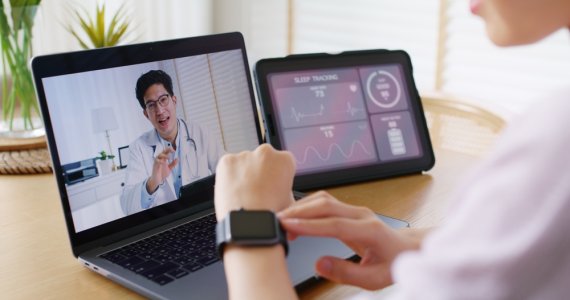Are Your Medicare Benefits at Risk? Here’s Why You Could Lose Big by Year's End!
As the year draws to a close, a pressing concern looms over the heads of approximately 67 million Americans who rely on Medicare for their healthcare needs. The potential loss of certain Medicare benefits could significantly impact the lives of these individuals, leaving many to wonder what the future holds for their access to healthcare services.
The heart of the issue lies in the provision of telehealth services, which have seen a meteoric rise in popularity since the onset of the COVID-19 pandemic. Telehealth has revolutionized the way patients interact with healthcare providers, offering a convenient and flexible option for those who may face barriers to in-person visits. From mental health therapy to primary care consultations, telehealth has become a routine part of the healthcare landscape. Perhaps even you, have had a telehealth appointment that has meant you could attend an appointment that otherwise would have been difficult in-person.
Chris Fong, CEO of Smile Insurance Group, emphasized the importance of telehealth, particularly for those in rural areas with limited access to providers and for individuals who depend on regular mental health appointments. The convenience and accessibility of telehealth have made it an indispensable component of modern healthcare.
However, the continuation of these services is under threat. The Telehealth Modernization Act of 2024, which is currently making its way through the legislative process, seeks to extend telehealth services for an additional two years. Without this extension, many Medicare beneficiaries could find themselves without the option of remote healthcare consultations.
Alex Beene, a financial literacy instructor at the University of Tennessee, has called for a more permanent solution to the telehealth service dilemma. The potential discontinuation of these services could be catastrophic for the millions who have come to rely on them for essential healthcare.
In the absence of an extension, Medicare patients in rural areas may still be able to access telehealth services, but with the caveat that they must use technology at a healthcare facility to communicate with a provider located elsewhere. Additionally, telehealth services would continue to be approved for specific conditions such as stroke, mental illness, and substance use disorders.
While telehealth has been associated with reduced emergency room visits and improved health outcomes, particularly in medication management, it also contributes to Medicare's overall costs. With Medicare already facing a funding crisis that could result in a shortfall by the mid-2030s, the increased costs associated with telehealth are a significant concern. Studies cited in Congressional testimony have shown a 2.2 percent annual increase in telehealth visits, leading to a 1.6 percent rise in spending per capita.
The Centers for Medicare and Medicaid Services (CMS) have expressed their desire to maintain quality care and services for Medicare beneficiaries, highlighting the role of telehealth in promoting equity. Access to remote healthcare is especially crucial for individuals in underserved areas who may struggle with transportation or have limited broadband access.

Members, we’d love to know what you think of Telehealth? And whether you think it is worth extending its use? Maybe you have used it yourself or maybe you prefer in-person appointments, either way share your stories and concerns with us in the comments below!
The heart of the issue lies in the provision of telehealth services, which have seen a meteoric rise in popularity since the onset of the COVID-19 pandemic. Telehealth has revolutionized the way patients interact with healthcare providers, offering a convenient and flexible option for those who may face barriers to in-person visits. From mental health therapy to primary care consultations, telehealth has become a routine part of the healthcare landscape. Perhaps even you, have had a telehealth appointment that has meant you could attend an appointment that otherwise would have been difficult in-person.
Chris Fong, CEO of Smile Insurance Group, emphasized the importance of telehealth, particularly for those in rural areas with limited access to providers and for individuals who depend on regular mental health appointments. The convenience and accessibility of telehealth have made it an indispensable component of modern healthcare.
However, the continuation of these services is under threat. The Telehealth Modernization Act of 2024, which is currently making its way through the legislative process, seeks to extend telehealth services for an additional two years. Without this extension, many Medicare beneficiaries could find themselves without the option of remote healthcare consultations.
Alex Beene, a financial literacy instructor at the University of Tennessee, has called for a more permanent solution to the telehealth service dilemma. The potential discontinuation of these services could be catastrophic for the millions who have come to rely on them for essential healthcare.
In the absence of an extension, Medicare patients in rural areas may still be able to access telehealth services, but with the caveat that they must use technology at a healthcare facility to communicate with a provider located elsewhere. Additionally, telehealth services would continue to be approved for specific conditions such as stroke, mental illness, and substance use disorders.
While telehealth has been associated with reduced emergency room visits and improved health outcomes, particularly in medication management, it also contributes to Medicare's overall costs. With Medicare already facing a funding crisis that could result in a shortfall by the mid-2030s, the increased costs associated with telehealth are a significant concern. Studies cited in Congressional testimony have shown a 2.2 percent annual increase in telehealth visits, leading to a 1.6 percent rise in spending per capita.
The Centers for Medicare and Medicaid Services (CMS) have expressed their desire to maintain quality care and services for Medicare beneficiaries, highlighting the role of telehealth in promoting equity. Access to remote healthcare is especially crucial for individuals in underserved areas who may struggle with transportation or have limited broadband access.
Key Takeaways
- Approximately 67 million Americans could lose access to certain Medicare benefits by the end of the year, potentially affecting their healthcare.
- Telehealth services have become essential, especially for those in rural areas and for ongoing mental health treatments.
- The House of Representatives is considering the Telehealth Modernization Act of 2024 to potentially extend these services for two more years.
- Without an extension, Medicare's telehealth services may be reduced, although they will still cover strokes, mental illness, and substance use conditions; however, overall costs add to Medicare's current funding crisis.
Members, we’d love to know what you think of Telehealth? And whether you think it is worth extending its use? Maybe you have used it yourself or maybe you prefer in-person appointments, either way share your stories and concerns with us in the comments below!







